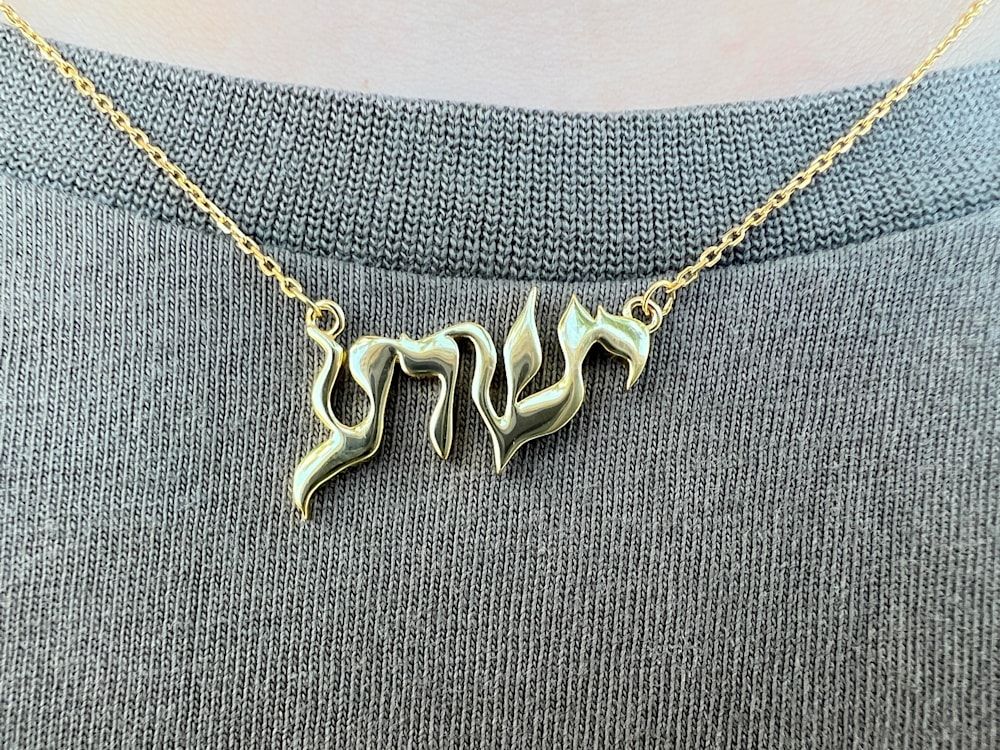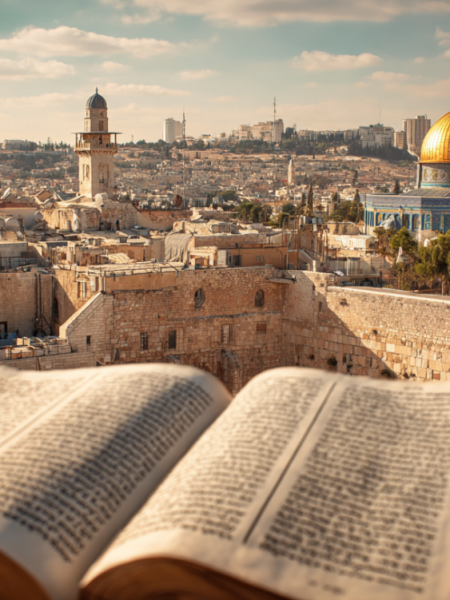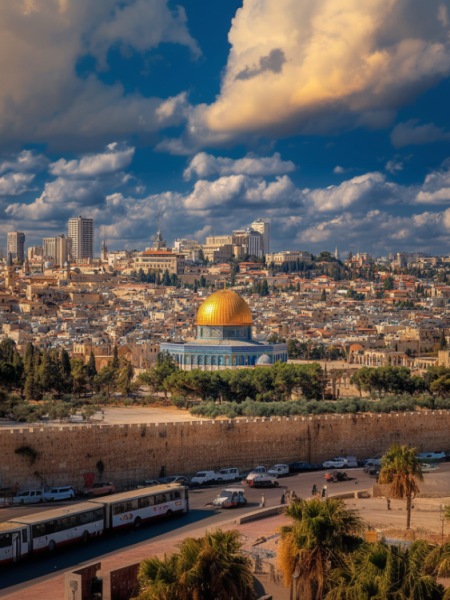 When Paul wrote to the believers in Rome, he used one of the most profound and enduring images in all of Scripture — the olive tree. This tree, deeply rooted in the soil of Israel, is more than just an agricultural symbol; it’s a living picture of God’s covenant relationship with His people and His redemptive plan through Yeshua, the promised Messiah.
When Paul wrote to the believers in Rome, he used one of the most profound and enduring images in all of Scripture — the olive tree. This tree, deeply rooted in the soil of Israel, is more than just an agricultural symbol; it’s a living picture of God’s covenant relationship with His people and His redemptive plan through Yeshua, the promised Messiah.
To understand the weight of Paul’s metaphor in Romans 11, we must look not only at theology but also at geography, culture, and the unbreakable bond between the olive tree and the land of Israel.
The Olive Tree and Its Roots in the Land of Israel
The olive tree is one of the oldest and most significant trees in Israel’s landscape. Found across the hills of Judea, Samaria, and the Galilee, these ancient trees can live for thousands of years — their gnarled trunks standing as silent witnesses to the unfolding of Israel’s history. The Mount of Olives in Jerusalem itself is a testament to the spiritual and historical meaning of this tree.
The olive tree thrives in harsh conditions — in rocky soil, under hot sun, with little water. It reflects the resilience of the people of Israel who, despite centuries of hardship and dispersion, remain rooted in their identity and God’s promises. In Scripture, the olive tree often symbolizes peace, blessing, and divine favor. In Psalm 52:8, David says, “But I am like a green olive tree in the house of God; I trust in the mercy of God forever and ever.”
Just as the olive tree draws nourishment from its deep roots, Israel draws spiritual life from the covenant made with Abraham, Isaac, and Jacob. The roots of this tree represent the faithfulness of God — His promises that never fade.
Paul’s Revelation in Romans 11
In Romans 11:17–24, Paul uses the olive tree as a metaphor to explain the relationship between Israel and the nations — between Jews and Gentiles who believe in Yeshua. He writes:
“If some of the branches were broken off, and you, being a wild olive tree, were grafted in among them and became a partaker of the root and fatness of the olive tree…” (Romans 11:17)
Here, Paul is speaking to Gentile believers. He reminds them that they have been grafted into a tree that was not originally theirs — the cultivated olive tree representing Israel. The wild branches symbolize the nations who, through faith in Yeshua, are now part of God’s family.
But notice — the tree itself is Israel’s tree. The root system, the promises, the covenants, the Scriptures, and the Messiah Himself — all are Jewish. The nations do not replace Israel; they are joined to Israel’s story through Yeshua.
Paul warns the Gentiles not to become arrogant toward the “natural branches” — the Jewish people — saying, “Do not boast against the branches. But if you do boast, remember that you do not support the root, but the root supports you.” (Romans 11:18)
This truth is essential for the body of Messiah today. God’s plan is not to abandon Israel but to bring about a beautiful reconciliation — Jews and Gentiles united in one faith through Yeshua.
Israel’s Central Role in God’s Redemptive Plan
The olive tree imagery shows that Israel remains central in God’s eternal purposes. The “natural branches” that were broken off represent unbelieving Israel, but Paul assures us that this is not the end of their story.
“And they also, if they do not continue in unbelief, will be grafted in, for God is able to graft them in again.” (Romans 11:23)
This verse is filled with hope. It reflects God’s ongoing love for His chosen people and His desire that they come to know Yeshua as their Messiah.
Paul’s heart breaks for his people throughout Romans 9–11. He longed to see Israel restored to faith, saying, “My heart’s desire and prayer to God for Israel is that they may be saved.” (Romans 10:1)
Through the olive tree, Paul reminds the believers that salvation is not complete until Israel’s spiritual restoration takes place. The fullness of the nations and the redemption of Israel are intertwined — one cannot be fulfilled without the other.
The Spiritual Meaning of the Olive Tree
Olive oil, drawn from the fruit of the tree, was used in the Temple menorah, for anointing kings and priests, and for healing. It represents the Holy Spirit — the anointing and presence of God.
This means that the olive tree is not only a picture of covenant and identity but also of spiritual vitality. The sap that runs through the branches is the Spirit of God, giving life to every believer connected to Yeshua, the Root of Jesse (Isaiah 11:1).
The olive tree teaches us that there is only one source of life — and that source is found in the Messiah of Israel. Without connection to Him, the branches wither. But those who abide in Him bear fruit that remains (John 15:4–5).
The Olive Tree and the Heart of Evangelism
For Jewish people today, the olive tree remains a powerful symbol of identity and endurance. Yet Paul’s vision in Romans 11 reveals that the greatest fulfillment of this symbol is spiritual rebirth through Yeshua.
Modern ministries such as Israel Media Ministries carry this same passion that burned in Paul’s heart. Their work bridges the ancient roots of the olive tree with the living message of the Good News. By using creative media — films, testimonies, and digital outreach — they are showing the people of Israel that Yeshua is not foreign to their story; He is the fulfillment of it.
Through their mission, many young Israelis are rediscovering that faith in Yeshua is deeply Jewish — not a rejection of their heritage, but a completion of it. Just as wild branches are grafted into the cultivated tree, so Israel Media Ministries helps connect Jewish hearts back to the Root — to the One who came for them first.
Their approach is rooted in love, patience, and understanding of Jewish culture. They emphasize that God has never stopped loving Israel. His covenant remains, His promises stand, and His desire is that all of Israel would be grafted back into the olive tree of life.
A Call to the Nations and to Israel
Paul concludes his teaching in Romans 11 with a breathtaking vision:
“And so all Israel will be saved, as it is written: ‘The Deliverer will come out of Zion, and He will turn away ungodliness from Jacob.’” (Romans 11:26)
This is not just a theological statement — it’s a prophecy and a promise. The same olive tree that once symbolized Israel’s covenant will one day bear fruit in abundance as the Jewish people return to their Messiah.
For the nations, this is a call to humility and gratitude. The Church must remember its dependence on Israel’s spiritual roots and join in God’s redemptive plan — not in pride or replacement, but in partnership and love.
For Israel, the olive tree stands as a reminder of divine faithfulness. God has not forgotten His people. The Messiah came from among them, walked their land, and will one day return to Jerusalem to reign as King.
Conclusion
The olive tree in Romans 11 is not just a metaphor — it’s a mirror of God’s heart. Its roots stretch deep into the promises made to Abraham, its trunk represents the faithfulness of God, and its branches reveal His grace extended to all who believe.
Whether Jew or Gentile, every person who finds life in Yeshua is part of this tree — nourished by the same root, filled with the same Spirit, and destined to bear the same fruit of righteousness.
And as ministries like Israel Media Ministries continue to share this truth across Israel and beyond, the vision of Paul in Romans 11 becomes ever more alive — a vision of unity, restoration, and love that finds its source in the eternal olive tree of God’s redemption.
“For if the root is holy, so are the branches.” — Romans 11:16

Yeshua Necklace in Hebrew - Gold or Silver
It is a critical time for us to proclaim the name of Yeshua to Israel and to the world. If you’re watching the news, antisemitism is on the rise! My people are under attack. And as you probably realize now, Israel is also divided, and a house divided against itself cannot stand (Mark 3:25). The only One who can save Israel is Yeshua. I have created a new piece of jewelry, silver and gold necklaces, to call supporters of Israel to declare the name YESHUA over Israel. They are available in both Hebrew and English (Yeshua).
Order Yours Now



